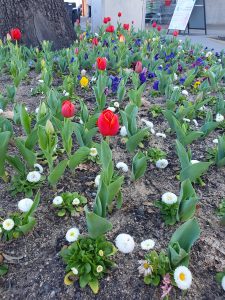On 8 May 2023 Deakin, and Yarralumla Residents Associations, assisted by Anthony Senti hosted a Public Seminar to provide Canberrans with an insight into alternative public transport technologies/solutions that are available/will be available to transport in Canberra — alternatives that could provide a more efficient, cost-effective, public transport system. The seminar featured three keynote speakers who presented papers on:

Trackless Tram
- driverless cars
- electric buses
- trackless trams.
The meeting, which took place at the Canberra College Performing Arts Centre Theatre in Phillips attracted an audience of approximately sixty people.
The reasons for holding the seminar included:
- Climate change presents some major challenges for the transport sector.
- Vehicles with internal combustion engines are a significant source of greenhouse gas emissions.
- New technologies have become available over the last decade to reduce these emissions.
- The Australian public has limited knowledge of how fast these technologies are being adopted.
- Word of this progress seems to have been slow in reaching Canberra.
The seminar heard about some options which are currently available and warrant more serious consideration. The options presented have important advantages over the cars, buses, and light rail currently in use in Canberra (flexible, fast, efficient, economical, and near-zero emission urban transport solutions).

Reduced traffic and more open space
In opening the seminar, Dr John Bell, President of the Deakin Residents’ Association noted that more of us may be working from home since the arrival of COVID, but for most of us, getting to our place of work requires transport. We also need transport to access goods and services. Not all our requirements for daily living can be provided by local shops. Up till now, our suburban transport has largely relied on petrol or diesel-powered vehicles. This is going to have to change.
John went on to observe that decarbonising transport is now seen as critical to limiting global warming. The transport sector contributes around 20 per cent of Australia’s emissions. Electricity from wind and solar sources is seen as the best solution for decarbonizing the transport sector.
John noted that the direct use of electricity to power buses and rail has been around for a long time. However, advances in battery technology are reducing the need for overhead wires for buses. In a statement by the then Western Australian Premier, Mark McGown, on the 23 of April, he announced that WA bus fleets would go electric. There will be $125 million in State Government funds invested in the next financial year. This will be supplemented by a $125 million from Federal Government. This investment will deliver 130 new locally built electric buses and depot upgrades. The WA Premier said:
“Electric vehicles are the future, and this investment will ensure Western Australia’s public transport network is clean and green for our net-zero future.
“Expanding our electric bus network is already having a tangible impact to reduce carbon emissions.
“Importantly, we will build these busses right here in Western Australia – creating local manufacturing jobs and supporting local businesses.”
In Canberra, the ACT Government announced in February that it would lease 12 electric buses this year. Minister Steel said that the Government planned to order a further 90 electric buses with a view to having an all-electric fleet by 2040. That target has been criticized for not delivering emission reductions sooner. The need to achieve reductions in greenhouse gases is urgent. John observed that, given that Action Bus currently has a fleet of 456 buses, buying 102 electric buses by 2040 falls a long way short of what is needed. If the money currently being invested in Light Rail Stage 2A was invested in electric buses, it would cover replacing the entire Action bus fleet.
John noted that, when it comes to electric cars, Canberra is ready and enthusiastic. A couple of weeks previously, Cupra, a car company based in Spain and owned by Volkswagen, launched its new electric car at the Arboretum. Canberra has a relatively high ownership rate of electric cars. This suggests that numbers of Canberra residents recognise the merits of electric vehicles and buses.
Three speakers made presentations at the seminar. Their details and links to the presentations follow:
- Kent Fitch spoke on autonomous cars – presentation URL: bit.ly/427yhBk
- Leon Arundel spoke about electric buses
- Alex Paton presented on trackless trams.
- A shared fleet of autonomous cars in Canberra
- Electric bus rapid transit
- Introducing Trackless Trams
A dynamic discussion took place following the presentations.






 The planned Over 55s village development successfully negotiated a number of approval processes that required thorough vetting including:
The planned Over 55s village development successfully negotiated a number of approval processes that required thorough vetting including: One of the approved Territory Plan variations includes the transfer of about 10ha of golf club lease to the Red HIll Nature Reserve. Some of this area needs rehabilitation and we met with Mbark and the Federal Golf Club to discuss this and to learn about the current plans for the proposed village development. While the development will involve the removal of a number of mature trees, there are a number of compensations planned and we are happy with progress on plans for both the village and the rehabilitation & transfer of lease to the Reserve. There has been research undertaken of the wildlife in the proposed development area that has demonstrated limited impact including with regard to the threatened Gang-gang cockatoo.
One of the approved Territory Plan variations includes the transfer of about 10ha of golf club lease to the Red HIll Nature Reserve. Some of this area needs rehabilitation and we met with Mbark and the Federal Golf Club to discuss this and to learn about the current plans for the proposed village development. While the development will involve the removal of a number of mature trees, there are a number of compensations planned and we are happy with progress on plans for both the village and the rehabilitation & transfer of lease to the Reserve. There has been research undertaken of the wildlife in the proposed development area that has demonstrated limited impact including with regard to the threatened Gang-gang cockatoo.
